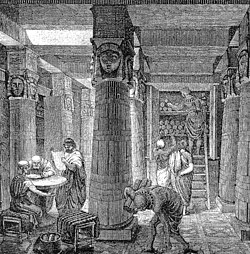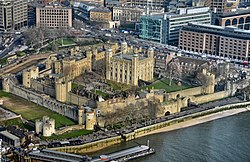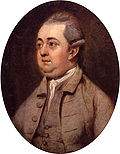Portal:History
The History Portal
History is the systematic study of the past, focusing primarily on the human past. As an academic discipline, it analyses and interprets evidence to construct narratives about what happened and explain why it happened. Some theorists categorize history as a social science, while others see it as part of the humanities or consider it a hybrid discipline. Similar debates surround the purpose of history—for example, whether its main aim is theoretical, to uncover the truth, or practical, to learn lessons from the past. In a more general sense, the term history refers not to an academic field but to the past itself, times in the past, or to individual texts about the past.
Historical research relies on primary and secondary sources to reconstruct past events and validate interpretations. Source criticism is used to evaluate these sources, assessing their authenticity, content, and reliability. Historians strive to integrate the perspectives of several sources to develop a coherent narrative. Different schools of thought, such as positivism, the Annales school, Marxism, and postmodernism, have distinct methodological approaches.
History is a broad discipline encompassing many branches. Some focus on specific time periods, such as ancient history, while others concentrate on particular geographic regions, such as the history of Africa. Thematic categorizations include political history, military history, social history, and economic history. Branches associated with specific research methods and sources include quantitative history, comparative history, and oral history.
History emerged as a field of inquiry in antiquity to replace myth-infused narratives, with influential early traditions originating in Greece, China, and later in the Islamic world. Historical writing evolved throughout the ages and became increasingly professional, particularly during the 19th century, when a rigorous methodology and various academic institutions were established. History is related to many fields, including historiography, philosophy, education, and politics. (Full article...)
Featured picture
Did you know (auto generated)

- ... that the Quad Cities forecast office of the National Weather Service has been directly struck by both an F1 tornado and a historic derecho?
- ... that Scholastique Dianzinga edited a post-independence history of women in the Republic of the Congo that discussed why women's emancipation has been hindered?
- ... that Chris Wroblewski was the starting point guard for the winningest team in Ivy League history?
- ... that the first volume of Felix Klein's books on the history of mathematics does not mention the three women who originally transcribed his lectures?
- ... that the course of the Panzer Dragoon series has been said to parallel the history of the Sega Saturn?
- ... that an Armenian Apostolic Church lawsuit over the Zeytun Gospels led Heghnar Zeitlian Watenpaugh to write a history of its separated canon tables?
Maximian (Latin: Marcus Aurelius Valerius Maximianus; c. 250 – c. July 310), nicknamed Herculius, was Roman emperor from 286 to 305. He was Caesar from 285 to 286, then Augustus from 286 to 305. He shared the latter title with his co-emperor and superior, Diocletian, whose political brain complemented Maximian's military brawn. Maximian established his residence at Trier but spent most of his time on campaign. In late 285, he suppressed rebels in Gaul known as the Bagaudae. From 285 to 288, he fought against Germanic tribes along the Rhine frontier. Together with Diocletian, he launched a scorched earth campaign deep into Alamannic territory in 288, refortifying the frontier.
The man he appointed to police the Channel shores, Carausius, rebelled in 286, causing the secession of Britain and northwestern Gaul. Maximian failed to oust Carausius, and his invasion fleet was destroyed by storms in 289 or 290. Maximian's subordinate Constantius campaigned against Carausius' successor, Allectus, while Maximian held the Rhine frontier. The rebel leader was ousted in 296, and Maximian moved south to combat piracy near Hispania and Berber incursions in Mauretania. When these campaigns concluded in 298, he departed for Italy, where he lived in comfort until 305. At Diocletian's behest, Maximian abdicated on 1 May 305, gave the Augustan office to Constantius, and retired to southern Italy. (Full article...)
On this day
October 29: Double Ninth Festival in China (2025); Republic Day in Turkey
- 1883 – The San Francisco Mint signed a contract to produce the Kalākaua coinage (coin pictured) for the Hawaiian Kingdom.
- 1948 – Arab–Israeli War: The Israel Defense Forces massacred at least 52 villagers while capturing the Palestinian Arab village of Safsaf.
- 1955 – An explosion, likely caused by a World War II–era naval mine, capsized the Soviet ship Novorossiysk in the harbor of Sevastopol, with the loss of 608 men.
- 1999 – About 10,000 people died when the most intense tropical cyclone ever recorded in the North Indian Ocean made landfall in the Indian state of Odisha near Bhubaneswar.
- 2007 – Somali pirates hijacked a North Korean ship in the Indian Ocean northeast of Mogadishu.
- Marie of Romania (b. 1875)
- Frances Hodgson Burnett (d. 1924)
- Phan Bội Châu (d. 1940)
- Primož Roglič (b. 1989)
Selected quote
My heart is a stone: heavy with sadness for my people; cold with the knowledge that no treaty will keep whites out of our lands; hard with the determination to resist as long as I live and breathe.
— Tecumseh, Native American tribal chief
Related portals
More Did you know...
- ... that the underground Fortress of Mimoyecques (pictured) was built by Nazi Germany to bombard London with 10 shells a minute using the V-3 supergun?
- ... that Howard P. Perry was the first African American recruit in the United States Marine Corps?
- ... that the Chester city walls form the most complete circuit of Roman and medieval defensive town walls in Britain?
- ... that China's first female director was adopted by the first Premier of the People's Republic of China?
- ... that the Medieval Merchant's House in Southampton was being used as a brothel when bomb damage during the Blitz revealed the building's important medieval architecture?
- ... that the Sumerian "river of paradise", the Hubur, derived partly from real geography before becoming a demonic fantasy?
- ... that Bill Foley's photograph "The Last Smile" shows Anwar Sadat only moments before his assassination?
- ... that the 1911 Sarez earthquake triggered a huge landslide, forming the tallest dam in the world?
Topics
Categories

History • By period • By region • By topic • By ethnic group • Historiography • Archaeology • Books • Maps • Images • Magazines • Organizations • Fictional • Museums • Pseudohistory • Stubs • Timelines • Chronology • People • Wikipedia historians
WikiProjects
![]() WikiProject History •
Ancient Near East • Australian History • Classical Greece and Rome • Dacia • Former countries • History of Canada • Chinese history • European history • Heraldry and vexillology • Indian history • Jewish history • Medieval Scotland • Mesoamerica • Military history • Middle Ages • History of Science
WikiProject History •
Ancient Near East • Australian History • Classical Greece and Rome • Dacia • Former countries • History of Canada • Chinese history • European history • Heraldry and vexillology • Indian history • Jewish history • Medieval Scotland • Mesoamerica • Military history • Middle Ages • History of Science
WikiProject Time • Days of the Year • Years
WikiProject Biography • Composers • Political figures • Saints • United States Presidents
Things you can do
 |
Here are some tasks awaiting attention:
|
Associated Wikimedia
The following Wikimedia Foundation sister projects provide more on this subject:
-
Commons
Free media repository -
Wikibooks
Free textbooks and manuals -
Wikidata
Free knowledge base -
Wikinews
Free-content news -
Wikiquote
Collection of quotations -
Wikisource
Free-content library -
Wikiversity
Free learning tools -
Wiktionary
Dictionary and thesaurus











































